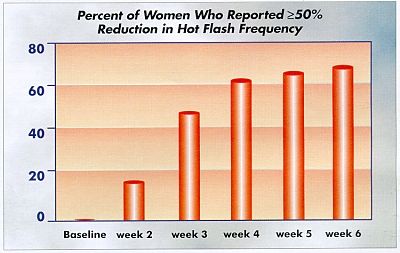SSRIs May Reduce Hot Flashes in Breast Cancer Survivors
TAMPA, Fla-Anecdotal reports suggest that the selective serotonin-reuptake inhibitors (SSRIs) commonly prescribed for depression might be efficacious in alleviating hot flashes in breast cancer survivors without the risks associated with hormonal therapies. Vered Stearns, MD, of the Lombardi Cancer Center, Georgetown University Medical Center, discussed her research at the American Cancer Society’s 42nd Annual Science Writers Seminar.
TAMPA, FlaAnecdotal reports suggest that the selective serotonin-reuptake inhibitors (SSRIs) commonly prescribed for depression might be efficacious in alleviating hot flashes in breast cancer survivors without the risks associated with hormonal therapies. Vered Stearns, MD, of the Lombardi Cancer Center, Georgetown University Medical Center, discussed her research at the American Cancer Societys 42nd Annual Science Writers Seminar.
Dr. Stearns was the lead investigator of a study that tested the effectiveness of the SSRI paroxetine (Paxil) in the treatment of hot flashes. We enrolled 30 women with prior breast cancer who were suffering at least two hot flashes a day in a single-institution pilot trial. Our endpoint was to determine paroxetines efficacy in reducing the frequency and severity of the episodes, Dr. Stearns said.
After completing daily diaries for 1 week on no therapy, the women received open-label paroxetine 10 mg for 1 week, followed by 4 weeks of paroxetine 20 mg daily. The women completed hot-flash daily diaries throughout the study, and a health-related symptom-assessment questionnaire and quality-of-life rating scale in the first and sixth weeks, she said.
Of the original 30 women, 27 completed the 6-week study. The mean reduction in hot flash frequency was 67%, and the mean reduction in severity was 75%. There was also a statistically significant improvement in depression, sleep, anxiety, and quality-of-life scores.

The most common adverse effect was somnolence, which resulted in discontinuation in two women and dose reduction in two women, Dr. Stearns said.
Our studies indicate that the relative benefits achieved with paroxetine clearly, in most instances, outweigh the negative side effects, including varying degrees of drowsiness. Its clear that paroxetine has an important role to play in assuaging the debilitating effects of hot flashes, she said. The study was recently published in the Annals of Oncology (11:1-6: 2000).
Dr. Stearns is currently conducting a prospective, randomized, placebo-controlled clinical trial to further determine the effectiveness of paroxetine in reducing hot flashes. She pointed out that pilot studies of other SSRIs in breast cancer survivors and in men on androgen blockade have shown promising results. Further studies investigating the mechanism of action of SSRIs in controlling hot flashes are necessary, she concluded.